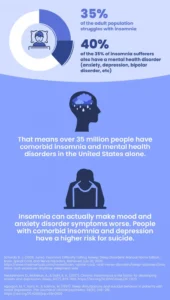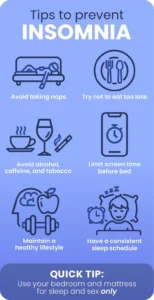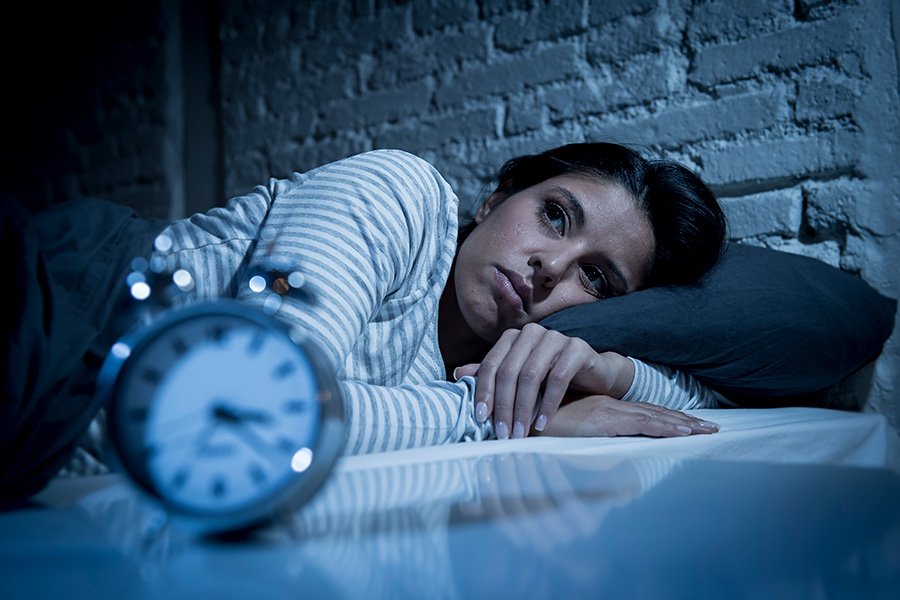What are the reasons of sleeplessness at night?
Most of the people have the problem of sleeplessness that they can’t sleep at night, this condition is called insomnia. It may occur due to any stress or any disease depending upon their lifestyle their habitat and their mental health. It can destroy your life schedule and make you unable to pay attention on your work. Most of the medical problems can also cause insomnia and use of medication for their treatment can also induce insomnia. So let have discussions on insomnia
Insomnia
It is a common sleep disorder in which a person can’t sleep well or feeling hard to asleep or make you wake up too early and not able to get back to sleep. It not only decrease your energy and make your mood off but also make health issues and decrease your work performance of your daily life. Different ages required different duration of sleep but in adult about 7 to 8 hours sleep is necessary.
It may be acute insomnia which is for several days or week or may be chronic related to any disease. If you have acute insomnia you can avoid this by changing your daily routine.
How can you know if you have insomnia ?
You have insomnia if you regularly
- Hard to sleep.
- Wake up during sleep several times.
- Wake up early and not able to sleep again.
- Still feel tired after wake up.
- Find it hard to nap during afternoon even you are tired.
- Feel irritable and not able to concentrate on work.
How much sleep you need ?
Everyone need different amount of sleep
- For babies need 12 to 17 hours of sleep.
- For children need 9 to 13 hours of sleep.
- For adults need.
What are the symptoms of insomnia?
The person who is suffering from insomnia will show the following symptoms
- Difficulty in falling asleep at night.
- Waking up at night.
- Not feeling well after night sleep or may restless after night sleep. .
- Daytime tiredness.
- Irritated, anxiety or depression.
- Having problem in paying attention.
- Increase doing mistake and error.
- Ongoing worries about sleep.
When to see a doctor?
If you symptoms get worst or you cannot sleep at all, walking at night without any reason, you are not feeling mentally healthy or feeling nausea, it’s an alarming condition that you have to see a doctor. If you are seeing any person that going through the same condition take them to the doctor.
What are the causes of insomnia?
Acute stress due to change in daily routine and it may last for few days or weeks. But chronic insomnia may be cause by any stress or any medical condition. Treating the underlying conditions may get rid of insomnia, but it may last for years.
Common cause of insomnia include
Stress
Stress of work, job, financial issues, family problem, loan make u thing about you at night and may not cause you to sleep well. Stressful life event also effect your sleep cycle and may put you in chronic insomnia.
Traveling or work schedule
One of the most common issue of insomnia is work of night shift which disturbs your routine. Night travelling is also dangerous as you can’t get your proper sleep which later on may cause chronic insomnia. Your sleep pattern act as an internal clock, guiding such things as your sleep-wakeup cycle, can boost your metabolism and maintain the body temperature. Disrupting your body’s circadian rhythms can lead to insomnia which may cause temporary sleep disorder. Traveling across multiple time zones, working a late or early shift, or frequently changing shifts.
Poor sleep habit
Poor sleep habit include irregular bedtime schedule, uncomfortable sleep place, nap early before sleep timing, using bed as your work place, watching TV and eating food on bed, TV screen or use of phone may disturb your sleep.
Eating too much late in the evening
Having a light snack before bedtime is ok, but eating too much may cause you to feel physically uncomfortable while lying down. Many people also experience heartburn, a backflow of acid and food from the stomach into the esophagus after eating, which may keep you awake.
Mental health disorders.
Anxiety disorders, such as post-traumatic stress disorder, may disrupt your sleep. Awakening too early can be a sign of depression. Insomnia often occurs with other mental health disorders as well.
Medications.
Many prescription drugs can interfere with sleep, such as certain antidepressants and medications for asthma or blood pressure. Many over-the-counter medications — such as some pain medications, allergy and cold medications, and weight-loss products — contain caffeine and other stimulants that can disrupt sleep.
Medical conditions.
Examples of conditions linked with insomnia include chronic pain, cancer, diabetes, heart disease, asthma, gastro esophageal reflux disease (GERD), overactive thyroid, Parkinson’s disease and Alzheimer’s disease.
Sleep-related disorders.
Sleep apnea causes you to stop breathing periodically throughout the night, interrupting your sleep. Restless legs syndrome causes unpleasant sensations in your legs and an almost irresistible desire to move them, which may prevent you from falling asleep.
Caffeine, nicotine and alcohol.
Coffee, tea, cola and other caffeinated drinks are stimulants. Drinking them in the late afternoon or evening can keep you from falling asleep at night. Nicotine in tobacco products is another stimulant that can interfere with sleep. Alcohol may help you fall asleep, but it prevents deeper stages of sleep and often causes awakening in the middle of the night.
Aging and insomnia
Insomnia become more common in old ages its due to
Changes in sleep patterns.
Sleep often becomes less restful as you age, so noise or other changes in your environment are more likely to wake you. With age, your internal clock often advances, so you get tired earlier in the evening and wake up earlier in the morning. But older people generally still need the same amount of sleep as younger people do.
Changes in activity.
You may be less physically or socially active. A lack of activity can interfere with a good night’s sleep. Also, the less active you are, the more likely you may be to take a daily nap, which can interfere with sleep at night.
Changes in health.
Chronic pain from conditions such as arthritis or back problems as well as depression or anxiety can interfere with sleep. Issues that increase the need to urinate during the night ―such as prostate or bladder problems ― can disrupt sleep. Sleep apnea and restless legs syndrome become more common with age.
More medications.
Older people typically use more prescription drugs than younger people do, which increases the chance of insomnia associated with medications.
Insomnia in children and teens.
Sleep problems may be a concern for children and teenagers as well. However, some children and teens simply have trouble getting to sleep or resist a regular bedtime because their internal clocks are more delayed. They want to go to bed later and sleep later in the morning.

What are the risk factors for Insomnia
Nearly everyone has Occasionally sleeplessness but chances to get high risk is increase of insomnia are
Old age
Old age people are high risk of insomnia because their regular work activity is decreased and most of the time they are free so it can cause insomnia.
Mental disorder
Any mental health condition can cause the insomnia also the drug use to treat the problem cause the insomnia as discussed earlier.
Stress
Stress can cause difficulty in sleep and cause insomnia.
Improper schedule
Irregular routine like late night eating late wakeup in the morning can disturb your sleep cycle and cause insomnia.
How you get to know if you have insomnia ?
Insomnia can be diagnosed by following methods
Physical exam
Your doctor may do a physical exam to look for signs of medical problems that may be related to insomnia. Occasionally, a blood test may be done to check for thyroid problems.
Sleep habit review
In this the doctor will ask some questions about your sleep to determine your sleep pattern.
Sleep study
If the cause of your insomnia isn’t clear, or you have signs of another sleep disorder, such as sleep apnea or restless legs syndrome (temporary sleep disorder), you may need to spend a night at a sleep center. Tests are done to monitor and record a variety of body activities while you sleep, including brain waves, breathing, heartbeat, eye movements and body movements.
What are the complications of insomnia?
Sleep is necessary for life if you lose sleep pattern or in case of insomnia your health or social life both get complicated because insomnia cause health problems and lower your attention to people. The complications of insomnia are:
- Lower performance.
- Slowed reaction time while driving and a higher risk of accidents.
- Mental health disorder such as anxiety, depression etc.
- Increase severity of long term disease such as high sugar level in blood, high blood pressure etc.

How to prevent insomnia
Good sleep can help in prevention of insomnia. Insomnia can be prevent by
- Keep your bedtime and wake time consistent from day to day, including weekends.
- Stay active — regular activity helps promote a good night’s sleep.
- Check your medications to see if they may contribute to insomnia.
- Avoid or limit naps.
- Avoid or limit caffeine and alcohol, and don’t use nicotine.
- Avoid large meals and beverages before bedtime.
- Make your bedroom comfortable for sleep and only use it for sex or sleep.
- Create a relaxing bedtime ritual, such as taking a warm bath, reading or listening to soft music.

How to treat insomnia:
Changing your sleep habits and addressing any issues to the doctor that may be associated with insomnia, such as stress, medical conditions or medications, can restore restful sleep for many people. If these measures don’t work, your doctor may recommend some therapy, medications or both, to help improve relaxation and sleep.
General supportive care:
- Stick to a sleep schedule. Keep your bedtime and wake time consistent from day to day, including on weekends.
- Stay active. .
- Check your medications. .
- Avoid or limit naps. .
- Avoid or limit caffeine and alcohol and don’t use nicotine. .
- Don’t put up with pain. .
- Avoid large meals and beverages before bed.
Author



